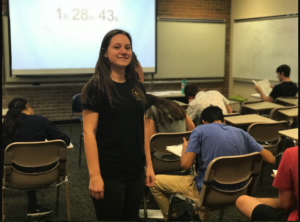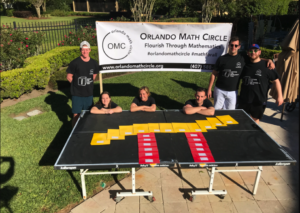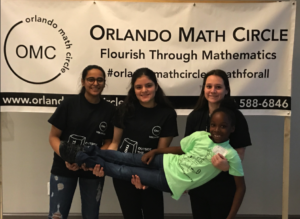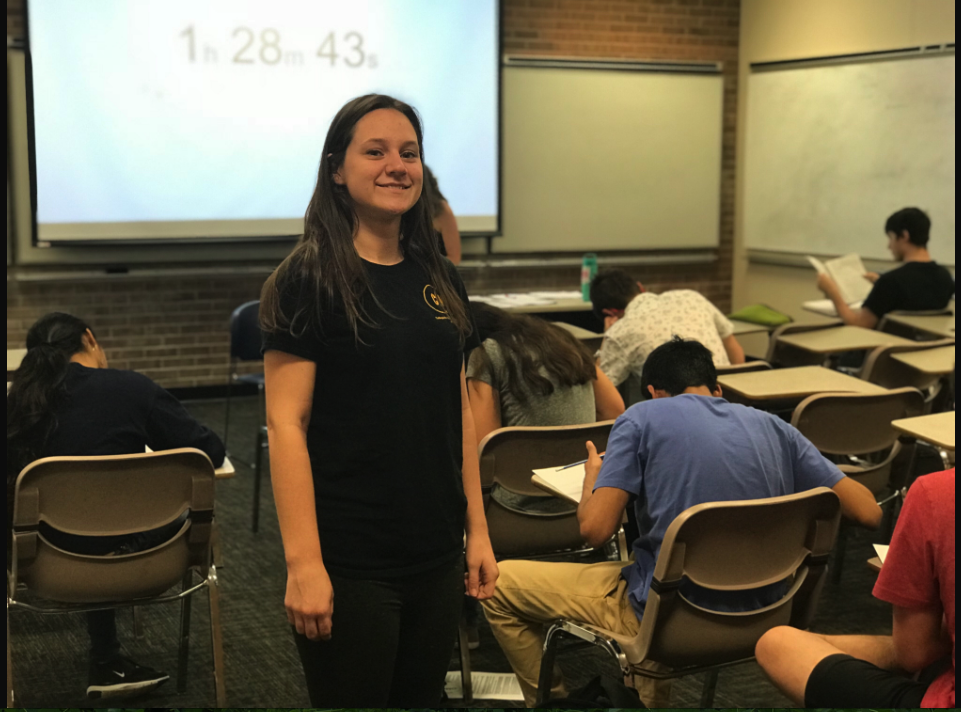The Orlando Math Circle family is made up of committed parents, engaged students, and fantastic volunteers. One of our college volunteers exemplifies our mission of making math accessible to everyone, especially girls. This young women is Jordin Rosser who, along with fellow volunteer Gabby Salinas, is a student at the University of Central Florida.
Last fall, Jordin led problem solving sessions to prepare a couple of young girls who were finalists in the regional “Who Wants to be a Mathematician?” competition, hosted by the American Mathematics Society (AMS). One OMC student, Esha, was the regional runner up, winning $500 and TI calculator! Our volunteers continually share their dedication to getting more female students interested in math, and both of the finalists Jordin helped prepare for the AMS competition have themselves worked on projects to get more girls involved. In fact, though they came from different schools, Esha and Sandy, who went to the regional competition and trained together with Jordin’s guidance, formed a special bond to support each other during the event that went beyond math. Esha helped Sandy get a “Who Wants to be a Mathematician?” lifeline person from her school, Orlando Science School, because this school is one of the few local schools that has a math team. Sandy’s school does not and, if not for her connection with Esha through OMC, she would have been alone.

Meet Jordin
Jordin is busy. She’s a computer science junior at UCF, an intern at Lockheed Martin, vice president of the STEM club at her school, and, of course, a volunteer with OMC. Jordin is motivated to work hard across all of her commitments by her mother, who grew up with very little and always taught Jordin that she should strive for success that will offer her the best chance to make herself happy in life. Jordin says that doing well in school and in her internship is her way of showing her mom that all of the sacrifices she made are important to who she is today.
As a first generation student and as a woman in STEM, Jordin finds these identities help her bring a new perspective in the field. Growing up, she went to public schools with underpaid teachers who worked hard to teach her and her peers advanced concepts in a difficult classroom setting. Jordin didn’t have a parent who was able to tutor her and her family didn’t have the luxury of hiring a private tutor for her. As a result, Jordin has had to work harder than some others in order to get to where she is today, and this experience has formed her ideas about making STEM accessible to those who are under-represented in the field.

The OMC Network
Jordin became involved with OMC after learning about our aim to get kids excited about math during a local makerspace event. Since getting started, Jordin has been able to pursue her own ideas with the support of the OMC community. Recently, she arranged qualifiers for local high students to participate in the Integration Bee, a competition offered through the Collegiate Mathematical Society (CMS) at UCF and previously closed to high schoolers. The qualifier for the bee challenged participants with a 20-question calculus integrals test, prepared by Jordin. Top scorers will advance to the final Integration Bee event on Friday, April 6.
Jordin engaged the OMC high school student network to reach participants for this event. OMC students regularly receive notices for upcoming competitions and events, such as UCF’s research expo today. Another upcoming activity our students may be interested in is a problem solving group, led by UCF computer science professor, Arup Guha. Here, students will discuss strategies for completion of tricky problems like they will see on the AMC 10/12 tests.
Bringing Integration Bee to the OMC community was an innovative way to connect high school and college students who share an interest in math, and to provide the younger students with a chance to learn a bit more about the college experience for STEM students. Extracurricular math activities like this are important to Jordin because they bring together students who enjoy math, but rarely get a chance to delve into math outside the classroom together. Through collaboration, students learn more from one another and form a community of like-minded individuals.

How Jordin Wants to Get More Girls in Math
One of the biggest issues in mathematics enrichment is participation by girls and students who are intimidated or put-off by the subject. As a child, Jordin never thought she was “a math person” and she wasn’t encouraged to appreciate math for the logic and patterns that make it such a beautiful area of study for her today. While, unfortunately, encouragement for pursuing math outside the school setting is scarce, Jordin finds that even fewer young women are encouraged to participate than male students. This creates a sense for many girls that they simply don’t belong in extracurricular math activities and clubs.
To challenge this trend, Jordin suggests STEM enrichment programs focus on offering all students diverse and fun math activities, from applied, to computational, to pure math, so the setting can be more open and everyone can find something they are successful in. With a more relaxed atmosphere like this, female students may be more comfortable to speak up and engage with the material and their male peers.
From Jordin to young girls interested in STEM subjects, “We, as women, should encourage one another and be each other’s support system. This stuff isn’t easy but, you are capable of doing anything you set your mind to. It may take a while to get to where you want to be, but if you stay determined and do not take ‘no’ for an answer, you will get where you want to go. Don’t be afraid to ask for help from peers, mentors, professors, advisers, whoever. The worst thing they can say is ‘I’m busy’.”

